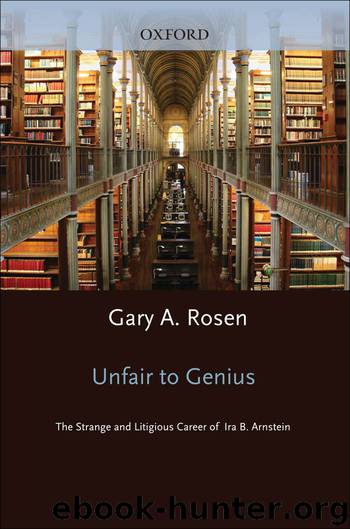Unfair to Genius by Rosen Gary

Author:Rosen, Gary
Language: eng
Format: epub
Publisher: Oxford University Press, USA
Published: 2012-03-14T16:00:00+00:00
The NAB conceded that the performing rights provisions of the copyright law, although conceived long before the advent of broadcasting, were at least “ambiguous” as applied to radio.28 It had no interest in following the path of the motion picture theater owners in trying to wear down ASCAP by defending numerous infringement suits, and it rejected ASCAP’s overtures that they contrive a single Shanley-like test case to settle the issue. The NAB chose, instead, to go on the offensive, launching an aggressive legal and public relations blitz calculated to gut the public performance right and destroy ASCAP.
It began, in the spring of 1924, with one of the first great demonstrations of the incipient power of broadcasting to mold public opinion, a propaganda campaign designed to drum up support for a “free radio music” bill that was pending in Congress. The bill, the product of intensive NAB lobbying, would have added a proviso to the 1909 Copyright Act that “copyright control shall not extend to public performances, whether for profit or without profit … by the use of the radio.” NAB executive chairman Paul B. Klugh’s radio address on behalf of the bill reached an audience of millions over a station hook-up provided by the NAB’s most powerful member, AT&T, and no law or regulation required that the opposition be given equal time or, for that matter, any time at all. At the outset of hearings before the Senate Committee on Patents, Clarence Dill of Washington, the bill’s sponsor, reported that “more telegrams have come in here on this bill than have ever come on any bill, except that for the declaration of war in 1917.”29
David Sarnoff of RCA had told another congressional committee: “We broadcast primarily so that those who purchase our receiving devices may have something to feed those receiving instruments with. Without a broadcasting sending station, the broadcast receiver is just a refrigerator without any ice in it.”30 In sharp contrast, Eugene McDonald of Zenith tried to convince the Dill Committee that there was no money at all to be had in broadcasting. McDonald testified that Zenith’s broadcasting activities had no effect on its sales of radio receivers, and that it broadcasted “simply because I have got that fever, the thrill of broadcasting. I love it.”31 Broadcasters could not convert their growing audiences into direct revenue, he said, because as soon as one “put obvious advertising on the air that station would be killed. The public would take care of that. There would be nobody listening.”32 Broadcasting, he insisted, was a public service. The NAB might just as well have brought a fife and drum corps to the hearing, so shamelessly did its witnesses wrap themselves in the flag. NAB director Klugh made an appeal on behalf of the “invalids, shut-ins, to whom radio certainly brings great relief from their physical and mental worries,” “the blind, who are certainly much benefitted by hearing things going on in the world,” and “deafened” people, who “can hear through radio what they cannot hear with even those devices provided for hearing.
Download
This site does not store any files on its server. We only index and link to content provided by other sites. Please contact the content providers to delete copyright contents if any and email us, we'll remove relevant links or contents immediately.
| Africa | Americas |
| Arctic & Antarctica | Asia |
| Australia & Oceania | Europe |
| Middle East | Russia |
| United States | World |
| Ancient Civilizations | Military |
| Historical Study & Educational Resources |
In Cold Blood by Truman Capote(3386)
The Innovators: How a Group of Hackers, Geniuses, and Geeks Created the Digital Revolution by Walter Isaacson(3210)
Steve Jobs by Walter Isaacson(2899)
All the President's Men by Carl Bernstein & Bob Woodward(2379)
Lonely Planet New York City by Lonely Planet(2227)
And the Band Played On by Randy Shilts(2210)
The Room Where It Happened by John Bolton;(2159)
The Poisoner's Handbook by Deborah Blum(2141)
The Innovators by Walter Isaacson(2105)
The Murder of Marilyn Monroe by Jay Margolis(2099)
Lincoln by David Herbert Donald(1989)
Being George Washington by Beck Glenn(1978)
A Colony in a Nation by Chris Hayes(1935)
Under the Banner of Heaven: A Story of Violent Faith by Jon Krakauer(1807)
Amelia Earhart by Doris L. Rich(1699)
The Unsettlers by Mark Sundeen(1691)
Dirt by Bill Buford(1682)
Birdmen by Lawrence Goldstone(1670)
Zeitoun by Dave Eggers(1654)
